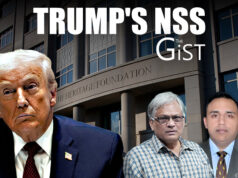
The sudden resignation of Canada’s finance minister has left the government in turmoil just weeks before the inauguration of a new U.S. administration that may impose severe sanctions on Canadian exports.
Chrystia Freeland quit on Monday after Prime Minister Justin Trudeau offered her a lesser position. She said his wish to increase spending could endanger Canada’s ability to withstand the damage done by the tariffs that U.S. President-elect Donald Trump is threatening to impose.
Canada’s Finance Minister had headed a special cabinet committee on U.S. relations and was working closely with the 10 provinces to ensure a united response.
“As a country we have to project strength and unity, and it’s chaos right now up in Ottawa,” Ontario Premier Doug Ford said after a scheduled online conference call of provincial premiers on Monday to discuss the U.S. threat.
An unimpressed Alberta premier, Danielle Smith, one of Trudeau’s biggest domestic critics, said the provincial leaders had only learned halfway through their call that the point person on Canada-U.S. relations had quit.
“It’s chaos. I’d be looking at this wondering who the next leader is … are they going to be able to bring forward a coherent plan? Is there going to be a team that is able to do a Team Canada approach?” she said.
“It’s not the greatest time to have a vacuum,” she added, calling for a national election to help restore stability.
Unhappy legislators from the ruling Liberal Party, some of whom have been calling on Trudeau to quit for months, met on Monday in Ottawa to vent their frustration.
The Liberals are trailing badly in the polls ahead of an election that must be held by late October 2025. Trudeau has until now ruled out the idea of resigning but if pressure on him mounts significantly, the results could be unpredictable.
“Trump will be inaugurated in 34 days. Canada must have a stable government,” former Trudeau foreign policy advisor Roland Paris said in a post on X.
When Trump came to power in 2017 he vowed to tear up the trilateral free trade treaty with Canada and Mexico. Freeland, who was then foreign minister, played a large role in helping renegotiate the pact and saving Canada’s economy, which is heavily reliant on the United States.
Vincent Rigby, a former national security and intelligence adviser to Trudeau, said the departure of Canada’s finance minister meant the stance with Trump was up in the air.
“This is going to be quite problematic for the prime minister from a political perspective, but it’s now also going to be problematic in terms of how the Canadian government deals with an incoming Trump presidency,” he said on the sidelines of an event in Washington.
The role of chief federal coordinator on U.S. relations now passes to Dominic LeBlanc, the new finance minister, who flew with Trudeau to Florida late last month to meet Trump.
“The one thing I think the American administration will respect is a government that’s focused on our common priorities, on the shared issues,” he told reporters after being appointed.
Freeland was not invited along. In September 2018, during the talks to rework the trilateral trade treaty, Trump made it clear he did not like Freeland.
“We’re very unhappy with the negotiations and the negotiating style of Canada. We don’t like their representative very much,” Trump said.
(With inputs from Reuters)




